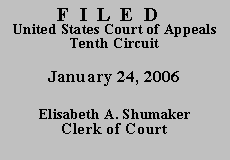

UNITED STATES COURT OF APPEALS
TENTH CIRCUIT
| THOMAS EDWARD GIRARDIN,
Petitioner - Appellant, v. KEVIN MILYARD, Warden, Sterling Correctional Facility; ATTORNEY GENERAL OF THE STATE OF COLORADO, Respondents - Appellees. |
No. 05-1384 (D.C. No. 05-CV-672-ZLW) (District of Colorado)
|
|
ORDER AND JUDGMENT(*) |
Before TACHA, Chief Judge, MURPHY and O'BRIEN, Circuit Judges.
Thomas Edward Girardin appeals the district court's denial of his 28 U.S.C. § 2254 petition, in which he argued that his convictions for attempted first degree murder and first degree burglary merge. Thus, the sentences should be served concurrently, and not consecutively as they were imposed.
Mr. Girardin previously filed a § 2254 petition in 1990, in which he challenged these convictions. The district court denied relief on the merits, see Girardin v. Pyle, 752 F.Supp. 979 (D.Colo. 1990), and this court affirmed. See Girardin v. Pyle, No. 91-1014, 1991 WL 104397 (10th Cir. Jun. 12, 1991) (unpublished).
A district court does not have jurisdiction to address the merits of a second or successive petition until this court has granted the required prior authorization under 28 U.S.C. § 2244(b)(3)(A). See Lopez v. Douglas, 141 F.3d 974, 975-76 (10th Cir.1998). Accordingly, we will construe the notice of appeal and appellate brief as an implied application under § 2244(b)(3)(A) for leave to file another habeas petition in the district court. Id. at 976.
Mr. Girardin must make a prima facie showing that satisfies § 2244(b)(2)'s criteria for the filing of another habeas petition. That section requires that:
(2) A claim presented in a second or successive habeas corpus application under section 2254 that was not presented in a prior application shall be dismissed unless--
(A) the applicant shows that the claim relies on a new rule of constitutional law, made retroactive to cases on collateral review by the Supreme Court, that was previously unavailable; or
(B)(i) the factual predicate for the claim could not have been discovered previously through the exercise of due diligence; and
(ii) the facts underlying the claim, if proven and viewed in light of the evidence as a whole, would be sufficient to establish by clear and convincing evidence that, but for constitutional error, no reasonable factfinder would have found the applicant guilty of the underlying offense.
Mr. Girardin does not meet these requirements. He states that he was not aware of the constitutional infirmity until 2002 when he found an unnamed Tenth Circuit case while researching in the law library. This does not constitute a new rule of constitutional law made retroactive to cases on collateral review by the United States Supreme Court, nor does it constitute newly discovered evidence.
The district court order is VACATED, and the implied application for authorization to file another § 2254 petition is DENIED. Permission to
appeal in forma pauperis is GRANTED. This matter is DISMISSED.
Entered for the Court
Per Curiam
*.This order and judgment is not binding precedent, except under the doctrines of law of the case, res judicata and collateral estoppel. The court generally disfavors the citation of orders and judgments; nevertheless, an order and judgment may be cited under the terms and conditions of 10th Cir. R. 36.3.